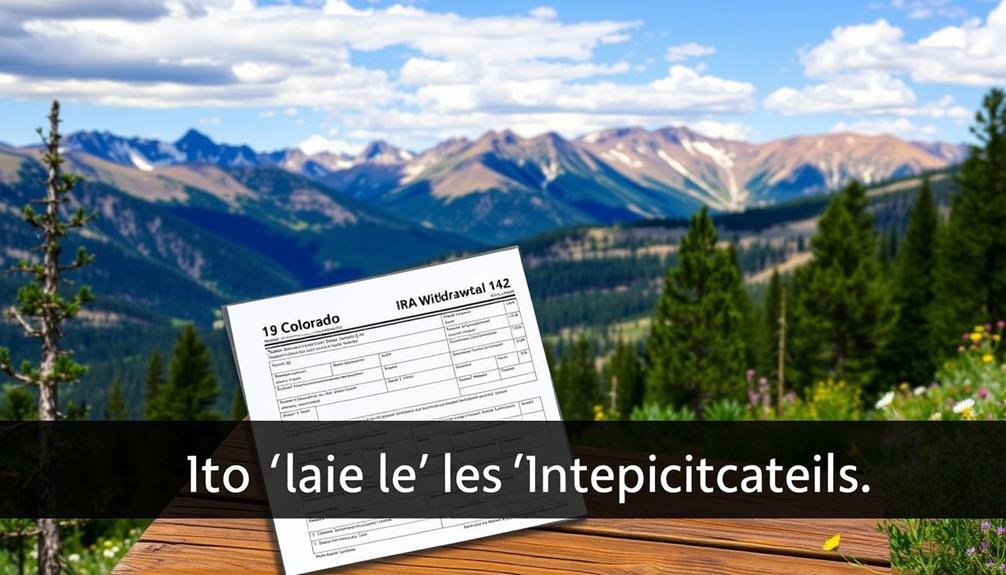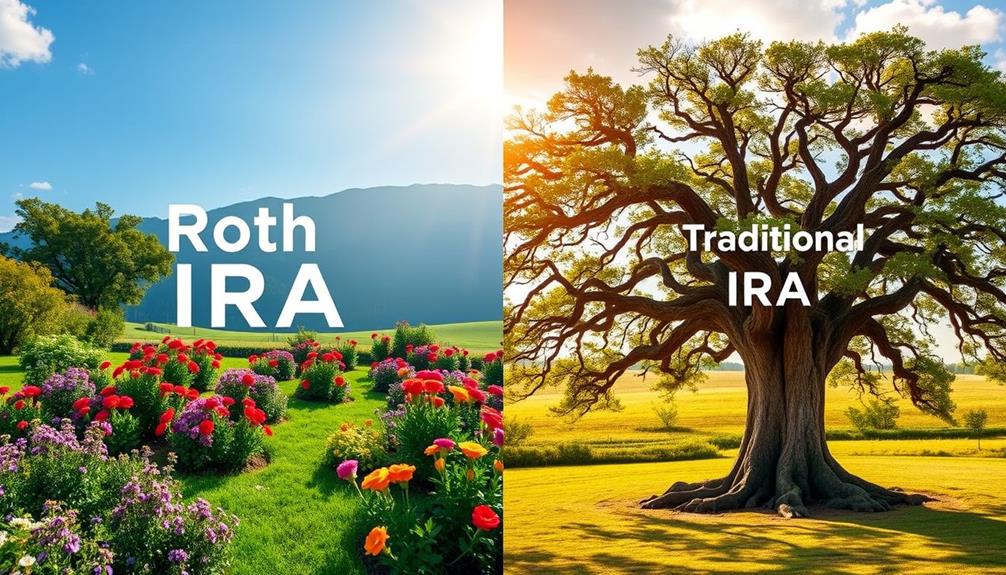In Colorado, distributions from your IRA are subject to a flat tax rate of 4.4%. This means that your traditional IRA withdrawals will be taxed as ordinary income. Individuals who are 55 years old or older can deduct up to $20,000 from their retirement income, including IRA withdrawals. For individuals who are 65 years old and above, the deduction amount increases to $24,000, providing considerable tax relief. Having a good understanding of these tax implications can help with planning. There is additional valuable information available to help optimize your retirement income strategy.
Key Takeaways
- Colorado taxes IRA withdrawals at a flat rate of 4.4% as ordinary income.
- Retirees aged 55+ can deduct up to $20,000 from their retirement income, including IRA withdrawals.
- Seniors 65+ can increase their retirement income deduction to $24,000, providing additional tax relief.
- Social Security benefits are also taxable, but seniors can deduct up to $24,000 from this income.
- Utilizing available deductions can significantly reduce overall taxable income during retirement in Colorado.
Colorado State Income Tax Overview

When it comes to Colorado state income tax, you'll find a straightforward approach. Colorado imposes a flat rate of 4.4% on all taxable income, which includes IRA distributions. This means that when you withdraw from your Traditional IRA, those funds are fully taxable as ordinary income, impacting your overall tax liability.
For retirees 55 and older, there's good news: you can qualify for a retirement income deduction of up to $20,000, which may apply to your IRA distributions. This can help lessen the impact of Colorado income tax on your retirement funds.
Additionally, if you're 65 or older, you can benefit from a deduction of up to $24,000 on your Social Security benefits, further reducing your state income tax burden.
It's important to note that Colorado doesn't have an estate or inheritance tax, which simplifies estate planning for those distributing their retirement accounts.
Understanding these aspects of Colorado taxes can help you manage your retirement income more effectively and make informed financial decisions.
Taxation of IRA Withdrawals

Understanding the taxation of IRA withdrawals is essential to managing your retirement funds effectively. In Colorado, the state income tax rate for IRA withdrawals is a flat rate of 4.4%, which applies to all types of income, including distributions from retirement accounts. This means that your retirement income is taxable, impacting your overall taxable income.
If you're aged 55 or older, you can deduct up to $20,000 of retirement income, including IRA withdrawals, from your taxable income. This increases to $24,000 if you're 65 or older, providing significant tax relief.
However, don't forget that income taxes also apply to your Social Security benefits, although seniors can benefit from additional deductions that may lessen your tax burden.
While Colorado doesn't impose an extra state tax on inherited IRA distributions, your regular income tax rate will still apply when you withdraw from these accounts.
Understanding these nuances in the taxation of IRA withdrawals is vital for effective retirement planning, as they contribute to your overall taxable income and can affect other tax liabilities. Always consider these factors to optimize your retirement strategy.
Implications for Social Security Income

Many retirees in Colorado can find that the tax implications of Social Security income greatly impact their overall financial picture. While Social Security benefits are taxable, individuals aged 65 and older may deduct up to $24,000 from their taxable income. This deduction can notably reduce your tax liability, especially if your total income remains below the taxable threshold.
In Colorado, the flat state income tax rate is 4.4%, which applies to Social Security income alongside all other income sources after deductions. Given that the average Social Security income for U.S. households is just over $21,000, many retirees may effectively pay little to no state taxes on their benefits.
Understanding how retirement income is taxed in Colorado is essential for effective financial planning. With the right strategies, you can minimize your state tax burden and keep more of your Social Security income for your needs.
Deductions and Exemptions for Seniors

As you navigate retirement in Colorado, it's important to take advantage of the deductions and exemptions available to seniors. These benefits can greatly reduce your taxable income and ease your tax burden.
Here are some key deductions and exemptions you should consider:
- Income Deduction: Seniors aged 65 and over can deduct up to $24,000 from their taxable income, including withdrawals from retirement accounts like IRAs.
- Property Tax Exemption: You may qualify for a property tax exemption, providing a 50% reduction on the first $200,000 of your home's value.
- Social Security Benefits: Although taxed at a flat rate of 4.4%, seniors can utilize deductions to effectively reduce their taxable income to zero.
- Rebate Program: Colorado's Property Tax/Rent/Utility rebate program offers financial relief of up to $1,112 for low-income seniors, helping you manage your expenses.
Resources for Tax Assistance

Maneuvering the complexities of tax season can be intimidating, but plenty of resources are available to help you manage your tax obligations in Colorado. For Colorado residents, accessing tax assistance is easier than you might think. Programs like IRS Volunteer Income Tax Assistance (VITA) and AARP Tax-Aide offer free tax preparation for low- to moderate-income taxpayers, ensuring you get the help you need with your tax filings.
Local organizations and community centers frequently host free tax preparation events, providing you with in-person guidance. If you prefer a more independent approach, check out Tax.Colorado.gov for online resources, including official forms and instructions for state tax filings.
AARP Colorado is an excellent resource for seniors, offering information on tax benefits and exemptions that may apply to your retirement income. Additionally, consulting a financial advisor can be invaluable for maneuvering the tax implications of IRA withdrawals.
Whether you're looking for free assistance or personalized strategies, these resources can help you make informed decisions and maximize your tax benefits. Don't hesitate to take advantage of the support available to you!
Frequently Asked Questions
Does Colorado Tax IRA Withdrawals?
Yes, Colorado does tax IRA withdrawals. When you take money out, it's considered regular income and taxed at the state income rate of 4.4%. Make sure to account for this in your financial planning.
Do You Pay State Income Tax on IRA Withdrawals?
Yes, you pay state income tax on IRA withdrawals. In Colorado, these withdrawals are taxed at a flat rate, so it's essential to factor them into your overall retirement income when calculating your tax liability.
What Is the Senior Income Tax Exemption in Colorado?
In Colorado, seniors can claim a retirement income deduction of up to $24,000, considerably lowering their taxable income. Additionally, you may qualify for property tax exemptions, further easing your financial burden.
Does Colorado Tax Inherited Ira?
Yes, Colorado does tax inherited IRAs at a flat rate of 4.4%. You'll need to follow specific distribution rules and consider how this tax impacts your overall financial strategy moving forward.
Conclusion
As you navigate the complexities of IRA withdrawals in Colorado, remember that understanding state tax implications can save you money and headaches. You've learned how these withdrawals might affect your taxes and your Social Security income, but there's more to uncover. What if you could maximize your deductions and exemptions? Don't miss out on potential savings! Stay informed and proactive, and you might just find a strategy that works perfectly for your financial future.









